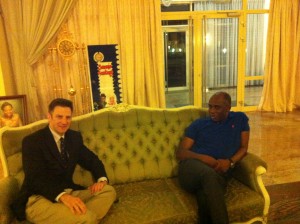Much of the attention on Nigeria’s preparations for its national, state, and local elections scheduled for 2015 has centered on administrative reforms, technological innovations, and the law. This post aims to compliment such analysis by focusing on two themes shaping the political climate, drawing in particular on my research trip to Rivers State and Abuja. Future posts will touch upon the state of “godfathers” in the states, and explore emerging campaign issues and other themes.
Center / periphery tensions
Unlike previous elections, training for the security services has begun in advance. Typically concerns have centered on preventing violence, but it is not clear how well the curriculum addresses the potential politicization of the police, which had been less of a concern following the 1999 transition than many observers feared. But last year in Rivers State, the police commissioner Mbu was fired for being openly partisan. Journalists and sources told me how police would show up at one rally to break it up and at another to protect the protesters. Governor Amaechi told me police still not free of partisanship, and he

The Police, who are controlled by the Federal Government, have barred the Rivers State Assembly from meeting in its chambers for six months.
supports state-level police – an issue before the national “confab.” The police have barred members of the Rivers House of Assembly from entering their legislative chamber (see photo). The state Assembly is therefore meeting off sight in an old building, and after a full on fist fight on the floor last year over the parliamentary mace, when five People’s Democratic Party (PDP) stalwarts attempted to convene the 32 seat Assembly, the Speaker is closely guarding the parliamentary mace.
Resources have been a recurring axis of state/center tensions for decades, and there have been some important shifts there too. The Speaker of the Ekiti State House recently said that even where state legislatures are productive, and government is not divided between different parties, dependence on the executive for funding is a problem (see “State Assemblies Need Financial Autonomy,” TELL, 21 April 2014). Rather than doing hearings, they conduct oversight through three “parlays” per year, where the assembly tells Governor Kayode Fayemi (an opposition governor) their findings. This dependence on the center actually shows great variation, as discussed by Dr. Funmbi Elemo in her excellent chapter in my book in progress, co-edited with Dr. Joseph Fashagba.
Under Nigeria’s elaborate revenue allocation system, states are statutorily entitled to a share of federal funds determined by a formula and administered by the Federal Revenue Allocation Commission. The point of the Commission is to depoliticize the distribution of oil revenues that accrue to the center. But the ruling PDP argues that states’ entitlement is not absolute. The National Assembly’s Hon. Austin Opara told me, “Where there is crisis, the revenues are kept in escrow account.” Withholding the funds has had not only the obvious political effect of infuriating opposition governors, it is also leading Governor Amaechi and others to borrow money from commercial banks, thus creating new debts during a time of national surplus which could soon cloud the rosy picture of the economy being painted by the Minister of Finance. After oil prices dropped in 1980, governors in Nigeria’s Second Republic also took out large loans (See The Rise and Fall of Nigeria’s Second Republic, 1979-84, by Toyin Falola and Julius Omozuanvbo Ihonvbere’s.)
The characterization by Hon. Opara (and other PDP politicians I spoke with) of political instability in Rivers also demonstrates how the ruling party believes it possesses significant discretionary authority since the laws governing revenue allocation do not permit the establishment of such escrow accounts, which can be used as a lever in opposition-controlled states. If such withholding is not politically motivated, then in my ongoing research I expect to identify evidence that PDP strongholds face similar budget constraints. And how will the budgets in other opposition states fare? The formal states of emergency in Borno, Yobe, Adamawa expires soon, but it will almost certainly be re-extended.
Debating the Laws of Decampment
There is a long tradition, going back to the First Republic, of party leaders accusing elected politicians of “anti-party activities.” This was common during Obasanjo’s first term as well. The emergence of the All Progressive Congress (APC), however, for now presents a viable alternative for members whose ambitions are frustrated by the national PDP’s efforts to control candidate selection. Moreover, the mass defections raise doubts about the efficacy of suspensions as tools for promoting party loyalty, according to senior APC politicians. A decline in disciplinary effectiveness could deepen desperation in the PDP.
Rivers State has emerged as a symbol for these issues. The tipping point was last year when the PDP replaced the governor’s close ally in the state party leadership, Ake, with a loyalist of current Minister of Education, Nyesom Wike. Not long after, the governor and the Rivers House of Assembly attempted to remove the Local Government Area chair and council members in Obio-Akpor. Since this is Wike’s home LGA, it became a much larger symbol of the contest between PDP and APC. But it is also of interest because it suggests first, how the three tiers of federalism multiply the possible interactions between local and national political structures. The Rivers governor is withholding funds for the LGA – much like the PDP is withholding funds for Rivers State.
Second, this is also of interest because of the role the courts have played. Election observers have routinely looked to the courts as a saving grace in Nigeria’s elections, by serving as a conflict resolution mechanism in disputes over who won particular elections, Buhari’s decision to take his protest to the judiciary rather than the streets in 2011 being the most prominent example out of hundreds of cases. In River State, the courts have upheld the chairmanship of Prince Timothy Nsirim in Obio-Akpor (click here to read the court judgement), but the APC in Rivers says they are appealing the decision which you can download here, and therefore do not recognize him. In other words, control over the Rivers State Assembly and this key LGA remains contested, with two sides in each instance claiming legitimate leadership. Rather than resolving the issue decisively, the courts are stuck in an argument that will draw out for months or even years.
Similarly, a court in Abuja ruled that the “New PDP” is not a faction. If it stands could effectively nullify the constitutional basis for forming the APC. Naturally, the APC is appealing. The key point is that the courts are likely to be much more involved in internal party politics than in previous elections, subjecting them to increased political pressure, and signaling that the Electoral Act for the 2015 elections will need to take careful preventative steps to promote both judicial neutrality and efficiency. The bill’s language on independent candidates will be critical not only because facilitating independent candidates could split opposition supporters and play into the hands of the PDP, but because it could increase politicians’ autonomy by allowing them to circumvent requirements for party factions.
